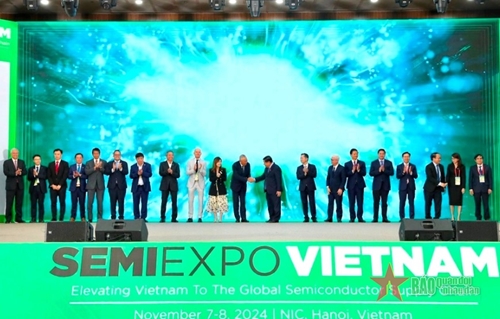Attractive to tech businesses and tech human resources
In the context of fierce competition among economies in semiconductor development, Vietnam has emerged as an alluring destination for investors in the field.
    |
 |
|
The 2024 Vietnam semiconductor industry exhibition attracts big tech partners. |
Global tech leader NVIDIA, the world’s most valuable company by market capitalization, has recently decided to turn its investment to Vietnam. Specifically, the group signed agreements with some of its partners to shift production chain from other countries to Vietnam, providing GPU and other connection devices with the investment commitment of USD 4 to 4.5 billion in four years with six localities in Vietnam.
Last December 5, the Vietnamese Government and NVIDIA signed an agreement to establish an artificial intelligence (AI) research and development center and an AI data center in Vietnam, turning the country into a hub for high-tech, semiconductor and AI in the region and the world.
Many experts assessed that the partnership with NVIDIA has had a big impact, drawing attention of other high-tech investors in the world, especially those in AI and semiconductor, and at the same time attracting and retaining many AI and semiconductor technology talents. These would be an important boost to help Vietnam make a tech leap in the coming time.
Actually, many leading tech giants, such as Qualcomm, LAM Research, Qorvo, and AlChip have planned to shift their supply chains to Vietnam in order to develop research centers, expand investment, business and production in the country.
In fact, Vietnam is gradually becoming one of the world's largest factories with the presence of a number of factories of leading companies. There are currently 174 FDI projects in the semiconductor sector with a total registered capital of nearly USD 11.6 billion in Vietnam. Attentively, thanks to the long-term vision and strong support from the Government, many Vietnamese tech enterprises have boldly invested in research and development and boosted international cooperation to grasp advanced chip design technology, helping Vietnam step-by-step get deeper into the global value chain of the semiconductor industry.
In this race, the Military Industry-Telecoms Group (Viettel) and FPT Group have taken the lead and gained initial achievements. FPT has developed microchip design service and successfully designed semiconductor chips. Meanwhile, Viettel has produced chips for 5G devices. Apart from design, Viettel and FPT, with the role of leading the Vietnamese semiconductor industry forward, target to be self-sufficient in chip production and packaging in the future.
Promising future
Last year, the global semiconductor industry accelerated strongly and earmarked nearly USD 600 billion. This market is forecast to continue to grow exponentially as the demand for AI chips increases; the electric vehicle industry will develop rapidly and become a global trend; and the 5G network coverage will continue to increase the demand for chips.
In addition, as countries continue to increase the application of advanced technologies in many fields, the further application of IoT in smart cities, industrial automation, agriculture and healthcare is also driving the demand for semiconductor components, such as microcontrollers, sensors and connection chips, creating a vibrant and promising semiconductor market.
The semiconductor industry has emerged as one of the strategic pillars of the 21st century. It is not only the foundation for tech devices, but also plays a core role in the digital economy of each country. According to Minister of Information and Communications Nguyen Manh Hung, in the race to master the semiconductor industry supply chain, tech giants are looking for more destinations and Vietnam is a safe destination for the global semiconductor industry.
Regarding the attractiveness of Vietnam, Minister of Planning and Investment Nguyen Chi Dung said that Vietnam has high-quality human resources, competitive costs; strong investment and upgrading of infrastructure; increasingly open and transparent mechanisms and policies; especially, the high political determination of the Party and State leaders, especially the attention and close direction of the Prime Minister. Recently, Vietnam has established a National Steering Committee for Semiconductor Industry Development with the Prime Minister as its head. The country has launched a human resource development program as well.
Moreover, the Vietnamese Government has issued a semiconductor industry development strategy by 2030 with a vision to 2050 with specific goals, laying a strong foundation for the domestic semiconductor industry to develop sustainably and integrate intensively to the global supply chain.
Based on this important orientation, ministries and sectors are accelerating improving quality of human resources, infrastructure system, energy supply, administrative reform to increase competitiveness, creating conditions for domestic enterprises and foreign investors to produce semiconductor in Vietnam.
Vietnam is having the opportunity to engage deeply in the semiconductor industry and has clearly demonstrated its aspiration to not only become a link in the global semiconductor supply chain but also to build a regional and global advanced and attractive semiconductor industrial ecosystem, helping Vietnam to be self-reliant and develop sustainably in this field. Vietnam has met all the conditions to stand ready to welcome and cooperate with enterprises and investors from all over the world in the semiconductor industry.
Translated by Mai Huong